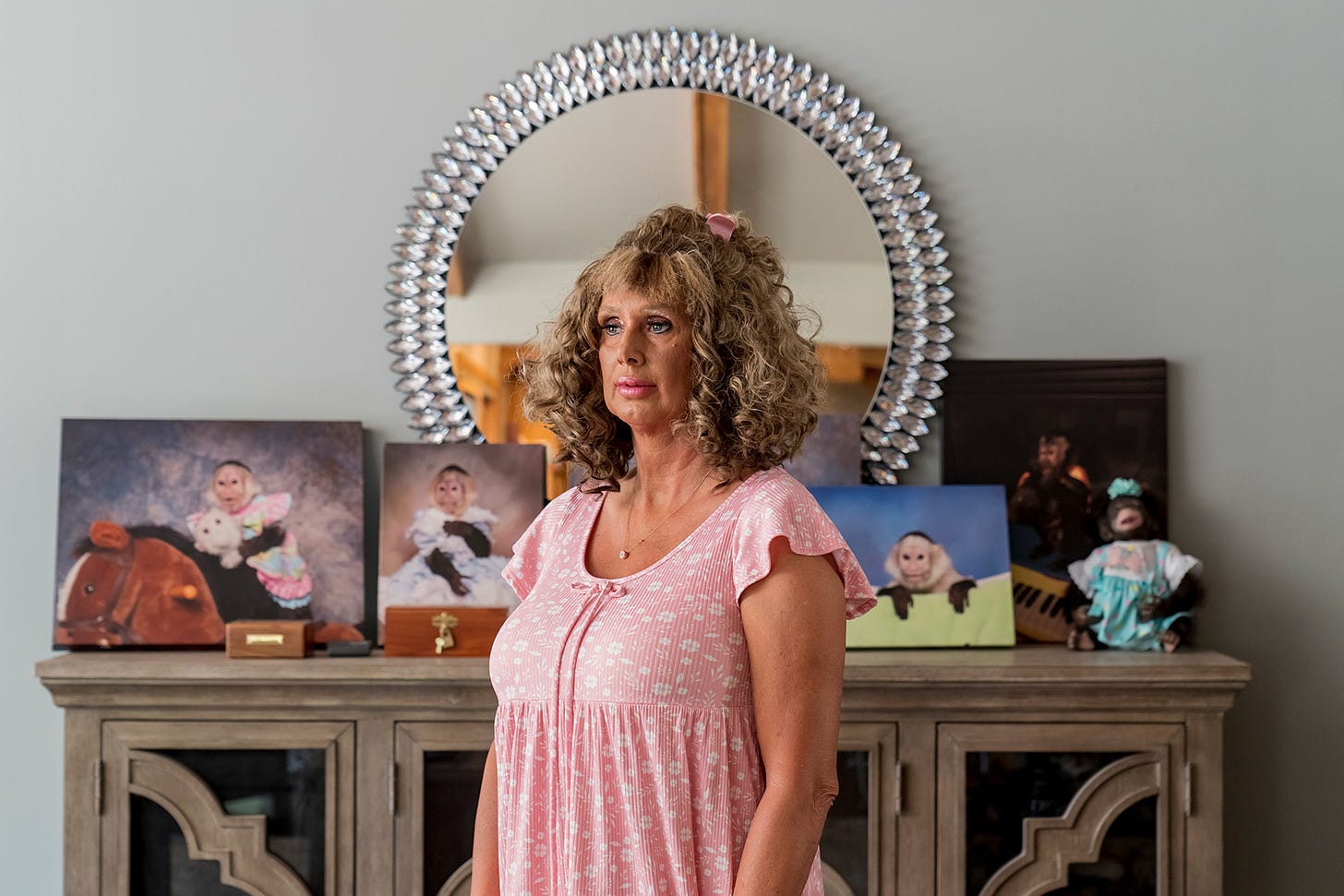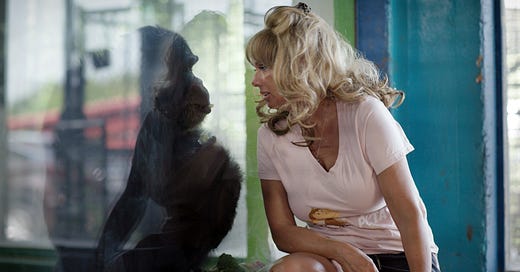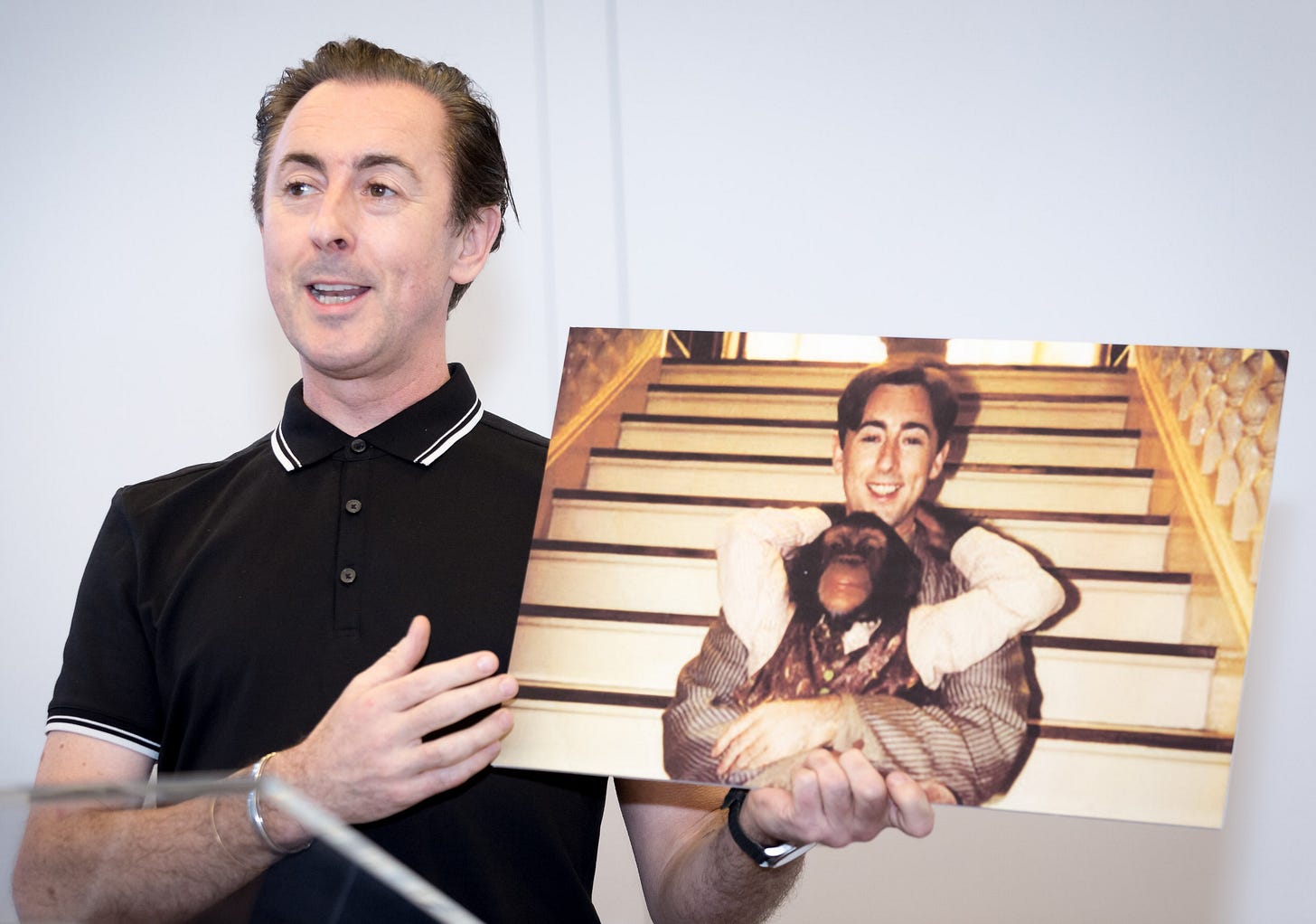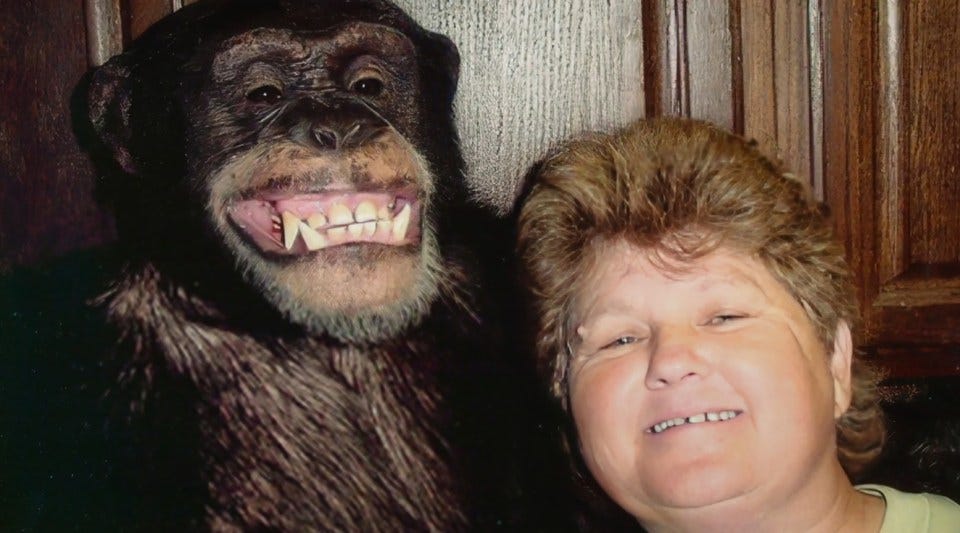'Chimp Crazy' is totally bananas
From the same guy that gave us 'Tiger King' is a whole different level of mayhem and I'm getting philosophical about it!!!!
A couple weeks ago, I got home from celebrating my 30th birthday. It was a Sunday. We recently relocated to Oklahoma and I was exhausted from the hustle and bustle of moving across the country and into a new decade. I turned on the television in hopes of finding something trashy and mindless to unwind to. What I found was not trashy or mindless—instead, I came across Chimp Crazy.
Remember 2020? What a mess of a year! Towards the beginning of the pandemic, there was all the craze around the Netflix docuseries, Tiger King. Is it a decent series? Sure! There is eccentric characters, a possible attempted murder plot, tigers, gay marriages, and so much more. The first season was even nominated for six Emmys.
Because so many of us were stuck at home with not much else to do, Tiger King became an entertainment lifeline. The story gave direct access to a subculture not many of us knew anything about prior to viewing which was especially necessary with the collective trauma of the COVID-19 pandemic. 34.3 million people viewed some amount of season one’s seven episodes within the first ten days of its release. But I don’t give a hoot about Joe Exotic and Carole Baskin. We need to talk about Tonia Haddix.

The Dolly Parton of Chimps
Eric Goode, the director and producer behind Tiger King, has a new subject: the self-proclaimed Dolly Parton of Chimps. “While I was filming what became Tiger King, I came to learn about this subculture of women who keep primates. They call themselves ‘monkey moms,’” said Goode in an interview with The Hollywood Reporter. “So, I started digging in. Through them, eventually, we eventually got to Tonia. But that took two years.”
Tonia is the star of this docuseries. She is to Chimp Crazy what Joe Exotic is to Tiger King. She wears various Barbie pink outfits, bad lip filler, and has a complete and rotating roster of really bad wigs. What’s especially fascinating about Tonia is her lack of discretion. Should she admit on camera that she cares for the chimps more than her children? Or commit several felonies while a documentary crew is capturing her every move? Probably not. Thankfully, that makes for good television (especially when her son talks on camera about how he felt about his mom’s confession).
Tonka the Hollywood Star
The first episodes of Chimp Crazy are backstory, which makes sense if Goode and his crew (including a proxy director who helps conceal the fact the same people behind Tiger King are, in fact, the ones looking into ape-owning shenanigans) were filming for two years before they even got to Tonia. A surprising character in this complicated, real life story is Alan Cumming. Yes, the bisexual Scottish actor known for such roles as Fegan Floop in the Spy Kids movies.
Cumming starred with Tonka, an ape actor who was in several movies in the late 1990s, in a film called Buddy (1997). The two shared a special bond while on set and later, Cumming was told that Tonka retired to an ape sanctuary. Instead, the chimp spent nearly two decades at Missouri Primate Foundation in Festus, Missouri.
What’s incredible is Missouri Primate Foundation is where Goode’s documentary crew were spending most of their time. Originally, they believed the best story would develop around Connie Casey, a notorious chimp breeder who earned a name in the St. Louis area through renting apes out for birthday parties.
As concern around Tonka and the other chimp’s safety grew, so did the potential for a lawsuit with the one and only PETA. Casey, who has been adamant about her distaste for being in the public eye, transferred ownership of everything to someone with a little less concern about what goes on the record. That’s right, Connie Casey signed her monkeys over to Tonia Haddix.
The real kicker
Long story short: lawsuit happens, Tonia loses, PETA has transporters come to take the chimps, they realize one is missing, Tonia explains that Tonka died, PETA doesn’t buy it, Tonia goes to great lengths to convince PETA that he did die, BIG REVEAL: Tonia still has him.
My quick summary of this whole fiasco isn’t a spoiler because seeing everything unfold is part of the magic. I recommend watching the entire docuseries because my one sentence doesn’t encapsulate the insanity that is Chimp Crazy. But the reason I feel the need to talk about the stuff the first three episodes is because the real dilemma emerged in the third episode that makes me anxious for the upcoming fourth and final entry.
Basically, Tonia admits to the proxy director that she has an appointment scheduled to have Tonka put down. This new information leads the production into an ethical gray area they aren’t super sure what to do in. They find themselves asking,
“Since we are here attempting to capture what is happening with as little interference as possible, what is our duty when death is on the table?”
Maybe that question translates a little less philosophical in the minds of those in the actual situation (and more like “HOLY SHIT! WHAT ARE WE SUPPOSED TO DO???”), but it really is a very meta moment. While a majority of documentaries unfold with the audience forgetting about the cameras, Chimp Crazy forces its viewers to be aware of this double consciousness.
Where does the ethical gray area start and end?
Who knew writing about a new documentary would lead to me writing about this odd experience I had in film school?
It was 2019. I was in my last semester as a full time student at Hunter College. Being a film major was so fun. In fact, that specific semester I was taking an independent study course where I studied John Ford’s representation of family in such films as Young Mr. Lincoln (1939) and The Grapes of Wrath (1940).
I was also taking a course called ‘Images of Resistance’, which according to the Hunter Course Catalog: “focuses on challenges by developing world films and filmmakers to Western media stereotypes.” I will not share the professor’s name because I am not going to paint her in a good light.
On the first day of class, we watched one of Jean Rouch’s ethnographic films (I forgot which one) and the next class we discussed the contents. Already, I wasn’t a big fan of the instructor. She made odd comments about Indigenous people yet claimed her great-great grandmother had been Australian aboriginal. Anytime I would ask questions (granted they might have been a little smart-assy because I have an undeniable need to question authority who act like they have the final say on things like colonization), she would roll her eyes and act as if I just was a little mosquito pestering her. I dreaded going. I didn’t want to spend six hours a week with a white savior of a film professor.
Eventually, I even emailed the department dean.
“…It just seems that REDACTED has no issue explaining her thoughts, feelings, and ideas regarding aspects of colonization but is unwilling to listen to other’s own experiences. Again, this makes for a horribly uncomfortable class and I am struggling to get through it every week.”
That only escalated the situation.
Evidence of that happened during the final class. It was the last day before the holiday break and we were not told until we were already there that the structure of the final would mean us being stuck at school for four hours. With this being an afternoon class, that meant I wouldn’t get home until 9 pm at the earliest. I rolled my eyes. The professor took notice and asked if I had an issue. That was the wrong thing to ask. I went off. Everything I had been attempting to be professional about came out of my mouth without a filter. And the same thing happened to her. She accused me of being the reason she wasn’t being asked back to teach. In. Front. Of. The. Whole. Class.
As she yelled at me, I packed up my things. “Where are you going? Sit down!” I remember her saying. In response, I looked at her and straight up said, “I’d rather fail this course than be in here one more second.”
The good news was our problems were documented. That email I had sent earlier in the semester was my saving grace. The professor was required to give me an alternate final at the beginning of the spring semester and I finished the class with a B.
Back to the monkeys
How does my experience connect to Chimp Crazy? It does in a very thin way. While I am a major consumer of documentaries, I also acknowledge there is no clear cut line for ethical rights and wrongs on all levels. That was something my ‘Images of Resistance’ class really awakened in me.
There is an unequal power balance when it comes to non-fiction filmmaking. The people behind the camera have control of what is captured, cut, and eventually shown to audiences. They control the narrative and while some documentarians believe there is a more equal ground when a more cinema vérité approach is utilized, others believe that just following the story, which can sometimes lead to the breaking of the fourth wall, gives a more authentic approach. Despite trying to be as ethically pure as possible, the camera’s presence will always be something that cannot be completely taken out of account. There is an element of the capturer versus the captive that cannot fully be removed from documentary.
That leads to so many more conundrums. Is anyone acting authentically when a camera is around? And what if the subjects aren’t? Are they liable for consequence of their actions under these pretenses? Are the filmmakers co-conspirators in these crimes? And specifically when it comes to Chimp Crazy: where does the line exist when a subject is not only confessing to crimes but is committing them?
Not a hater!!!
I promise I’m not a hater. I just love dissecting the idea of ethics because I grew up in a strict Christian household where the concepts of right and wrong were very definite. It wasn’t until I started pushing back on these definitions that I realized there is no clear answer to what is good and bad: it all depends on who you ask.
In a paragraph above I said,
“This new information leads the production into an ethical gray area they aren’t super sure what to do in.”
The production had been in a gray area from the beginning of the first episode. The proxy director is in place so that Connie Casey doesn’t know she’s letting in the guy who made Tiger King, cameras are put in just to capture PETA’s transfer of the apes, and heck! They even see Tonia feed multiple primates McDonald’s Happy Meals. Now, I know I’m not a zoologist but I don’t think they’re supposed to eat McNuggets.
It’s understandable the crew is at a crossroads at the end of episode three because of Tonka’s potential death. But is death where the ethically gray area began? No. But that’s what makes this docuseries fascinating.
In conclusion
If you got this far in my convoluted thoughts about Chimp Crazy: thank you. And here is the ultimate question that has no freaking answer:
If there’s no ethical consumption under capitalism, can ethical filmmaking exist?
My honest answer is no but I do believe we can attempt to find the balance between capturing truth, creating art, and telling a damn good story.








I just finished Chimp Crazy and I love your article because you wrote pretty much what I feel. I really enjoyed the show and the storytelling but I feel conflicted about the way they got the story out and the ethics of it all. I also read the Rolling Stones article they mentioned in the last episode and the author does a great job at covering the moral dilemma and grey ethical questions surrounding the docu.
It was definitely a wild ride.